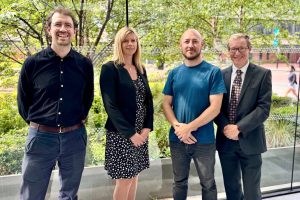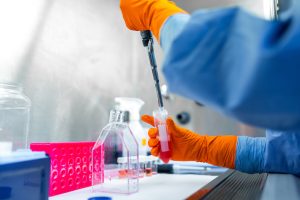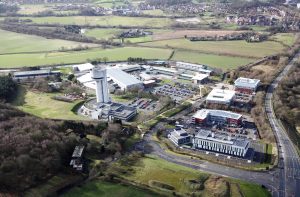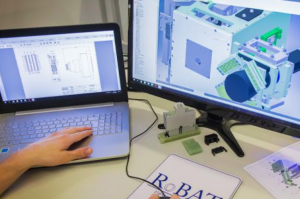£21m funding fillip for pioneering North West bio technology hub
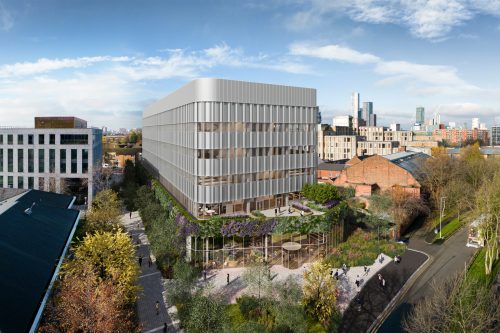
The Government has announced a £21m investment in UK Biobank in its plans to establish the region as a pioneering innovation hub at Manchester Science Park.
Science and Technology Secretary, Michelle Donelan, unveiled the funding today (February 9) for world-leading biomedical database, UK Biobank, which collects data from hundreds of thousands of British volunteers to give researchers the data sets they need to deliver medical breakthroughs, like tackling dementia and Parkinson’s.
This investment will cover a state-of-the-art robotic freezer that will store and retrieve the 20 million biological samples Biobank has access to, providing added capacity for future sample collections, and quadrupling the speed of retrieval to meet increasing demand from global researchers.
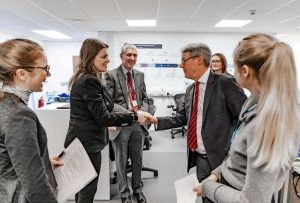
Michelle Donelan Manchester Science Park visit (UK Biobank/Tim Ainsworth)
This builds on the hundreds of millions of pounds already granted by the Government, and a further £32m philanthropic co-investment, which has allowed Biobank to move to a new purpose-built facility at the Manchester Science Park, which Donelan visited earlier this week, giving the organisation even better links to academic researchers and the NHS.
Donelan’s visit was to mark the future site of UK Biobank’s new £75m centre ready for construction.
UK Biobank, currently based in Stockport, will be relocated alongside fast-growth life science businesses working in diagnostics, genomics, biotech and precision medicine in the highly specialist purpose-built building, which includes specialist labs.
Prof Sir Rory Collins, Principal Investigator and CEO of UK Biobank, said: “This new facility is an essential step forward in ensuring that researchers across the globe can more efficiently access our tens of millions of samples to turn them into data which can be used to propel research and innovation.”
The North West holds huge clout in the UK’s R&D sector, as home to one of the world’s leading clusters of biosciences with companies, having an estimated £9.4bn turnover and one of the country’s top quantum research organisations at the University of Manchester.
This comes as the Department for Science, Innovation and Technology said it marks a year of progress on its five critical technologies – AI, quantum, engineering biology, future telecoms and semiconductors – as part of its mission to cement the UK’s place as a science and tech superpower.
Ms Donelan said: “Backing innovation and growth in our strong R&D sector across the country is imperative if we want to cement the UK’s place as a Science and Technology superpower by 2030.
“The North West is fast becoming one of the most significant areas of innovation and growth in the UK, especially with today’s announcement of a further expansion to UK Biobank’s activities that will secure it as a world leader in research.”
Biobank’s revolutionary database has already had a monumental impact on research for the world, with a recent genetic study by the Dementia Research Institute at Cardiff University issuing smart watches to volunteers of UK Biobank and measuring their movements to better detect Parkinson’s disease.
This potentially life-changing breakthrough means Parkinson’s can be detected seven years earlier than previously possible and opens up opportunities for people with the disease to access treatment before it causes extensive damage to the brain. The research was funded with support from UK Research and Innovation (UKRI).

Michelle Donelan in Manchester
In the past decade the UK has seen an unprecedented 41% rise in R&D jobs, with more than 730,000 created and 2.5 million currently employed in the sector, at least partly due to record public funding for R&D. Research funding has also backed the growth of innovative new businesses.
Despite making up just five per cent of total government R&D spending, Innovate UK has backed more than 25,000 promising innovative businesses in the past decade, with every £1 invested returning more than £6.20 back to the economy. Funding has been spread right across the UK, including in excess of £512m to the North of England.
To fulfil the UK’s vision for world class and globally leading clusters of innovation to exist across every corner of the country, the Department is also today releasing an interactive map online of the UK’s innovation clusters. It is the most comprehensive picture to date of firm-level innovation activity in the UK and will help policymakers, investors and many more besides to better understand, engage with and invest in the UK’s ecosystem.
The interactive tool ranks Greater Manchester as holding an essential cluster in Cheshire of innovative bioscience companies, with nearly 800 companies and nearly 20,000 employees, while Greater Manchester as a whole leads the country in quantum research and development.

